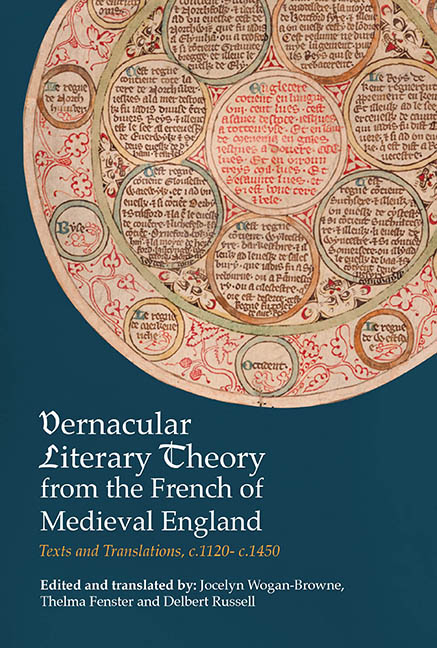 Vernacular Literary Theory from the French of Medieval England
Vernacular Literary Theory from the French of Medieval England Book contents
- Frontmatter
- Dedication
- Contents
- List of Maps and Illustrations
- Preface
- Abbreviations
- Map
- General Introduction
- Establishment of Texts and Translations and Conventions Used
- Part I Faus franceis and dreit engleis: On Language
- Part II Si sa dame ne li aidast: Authorship and the Patron
- Part III Primes dirrum la dreyte fei: The Conduct of Reading, Hearing and Seeing
- Part IV Ki veult oïr: Forming Audiences and Creating Textual Communities
- Part V Si come en latyn trovay escrit: The Lineage of the Text
- Postlude. Honneurs publiées … en divers royaumes
- Part VI Essays and Resources
- Timeline
- Glossary
- Bibliography
- General Index
- Index of Manuscripts
Part I - Faus franceis and dreit engleis: On Language
Published online by Cambridge University Press: 25 October 2017
- Frontmatter
- Dedication
- Contents
- List of Maps and Illustrations
- Preface
- Abbreviations
- Map
- General Introduction
- Establishment of Texts and Translations and Conventions Used
- Part I Faus franceis and dreit engleis: On Language
- Part II Si sa dame ne li aidast: Authorship and the Patron
- Part III Primes dirrum la dreyte fei: The Conduct of Reading, Hearing and Seeing
- Part IV Ki veult oïr: Forming Audiences and Creating Textual Communities
- Part V Si come en latyn trovay escrit: The Lineage of the Text
- Postlude. Honneurs publiées … en divers royaumes
- Part VI Essays and Resources
- Timeline
- Glossary
- Bibliography
- General Index
- Index of Manuscripts
Summary
Introduction
These phrases from the Nun of Barking and Marie de France, two twelfth-century women writers who thought a great deal about language and the valences and strategies of vernacular writing, effectively thematise Part I. An important subset of ‘situatedness’ is linguistic choice, and in a multilingual translating culture, there is considerable linguistic choice available. But, like authorship, medieval language choice may work by different paradigms than our own. As David Trotter points out, ‘an awareness of the differences between languages is not the same as a consciousness of the nationality of an individual word’. References to ‘English’ within Middle English texts have often attracted intense attention because they seem to promise access to a supra-textual ‘national’ story, however locally situated and strategic they may be. References to French, especially given its regional and supra-regional character, have not had the same charge in scholarship on England (though they are often deployed in modern accounts of social and linguistic hierarchy). What we may identify retrospectively as a lexical switch from French to English or vice versa may not necessarily have been historically settled or even conceptualised as a switch by medieval users: much medieval lexis was interchanged between what has only subsequently become classified as French and English. Mixed language was relatively routine across a range of pragmatic text types and practised as an art in macaronic poetry and prose, and it is often more helpful to think of writers as changing or adding registers rather than switching languages. Whatever the matrix language of a text may be, other languages are not precluded from being present in various ways (borrowed, alluded to, implicit in, or breaking through, as Christopher Baswell has argued, in a pentimento effect, etc.): other languages offer further resources and bring additional registers to the matrix language.
Writing in the vernacular is differently inflected for French than for Middle English, partly because of French's social prestige, its longstanding literary uses from the twelfth century on, and its increased deployment, in the later Middle Ages, as a language of record. Yet French texts almost never deprecate English. Linguistic hierarchies between French and English were initially complicated by overlaps and disjunctions between oral and written modes.
- Type
- Chapter
- Information
- Vernacular Literary Theory from the French of Medieval EnglandTexts and Translations, c.1120- c.1450, pp. 9 - 88Publisher: Boydell & BrewerPrint publication year: 2016


